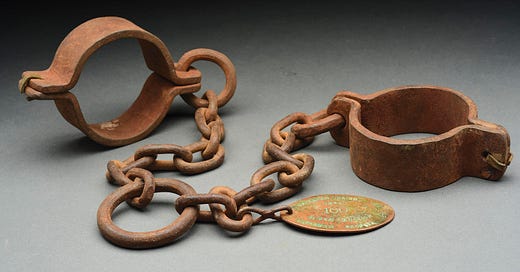Today I am in Providence, Rhode Island for an in-person Libertarian National Committee meeting. From this inauspicious location, we are making all the secret plans necessary to ensure that our society soon becomes a libertarian paradise where we all happily flourish in peace and harmony with our world and our fellow man and even our inner selves.
You’re welcome.
So for today’s article, I’m just going to ask a brief question: Did they repeal slavery in America?
My history books say that they did. Some tall guy in a top hat fought a war against Bo and Luke Duke in the mid-1800s and ended slavery. Or something like that.
But I’m not so sure. Did slavery end? What was the state and federal income tax rate in the early 1860s? Zero? Hmmm. Ours is higher now.
We get to vote for our Dear Leaders though. Surely slaves can’t do that! On the other hand, if you’re always on the losing side of the vote — or worse, hate the “choices” the crooked duopoly allows you in the general election — did you really get to vote?
If the puppeteer allows you the generous choice of voting for either Punch or Judy, aren’t you always really just voting for the puppeteer?
If you are forced into servitude to masters you didn’t choose voluntarily, free from any coercion, are you free? Or is it more accurate to say that you’re a slave?
Here’s a classic from Robert Nozick to demonstrate the point. It’s from his 1974 book, Anarchy, State, and Utopia:
THE TALE OF THE SLAVE
Consider the following sequence of cases, which we shall call the Tale of the Slave, and imagine it is about you.
There is a slave completely at the mercy of his brutal master’s whims. He often is cruelly beaten, called out in the middle of the night, and so on.
The master is kindlier and beats the slave only for stated infractions of his rules (not fulfilling the work quota, and so on). He gives the slave some free time.
The master has a group of slaves, and he decides how things are to be allocated among them on nice grounds, taking into account their needs, merit, and so on.
The master allows his slaves four days on their own and requires them to work only three days a week on his land. The rest of the time is their own.
The master allows his slaves to go off and work in the city (or anywhere they wish) for wages. He requires only that they send back to him three sevenths of their wages. He also retains the power to recall them to the plantation if some emergency threatens his land; and to raise or lower the three-sevenths amount required to be turned over to him. He further retains the right to restrict the slaves from participating in certain dangerous activities that threaten his financial return, for example, mountain climbing, cigarette smoking.
The master allows all of his 10,000 slaves, except you, to vote, and the joint decision is made by all of them. There is open discussion, and so forth, among them, and they have the power to determine to what uses to put whatever percentage of your (and their) earnings they decide to take; what activities legitimately may be forbidden to you, and so on.
Let us pause in this sequence of cases to take stock. If the master contracts this transfer of power so that he cannot withdraw it, you have a change of master. You now have 10,000 masters instead of just one; rather you have one 10,000-headed master. Perhaps the 10,000 even will be kindlier than the benevolent master in case 2. Still, they are your master. However, still more can be done. A kindly single master (as in case 2) might allow his slave(s) to speak up and try to persuade him to make a certain decision. The 10,000-headed monster can do this also.
Though still not having the vote, you are at liberty (and are given the right) to enter into the discussions of the 10,000, to try to persuade them to adopt various policies and to treat you and themselves in a certain way. They then go off to vote to decide upon policies covering the vast range of their powers.
In appreciation of your useful contributions to discussion, the 10,000 allow you to vote if they are deadlocked; they commit themselves to this procedure. After the discussion you mark your vote on a slip of paper, and they go off and vote. In the eventuality that they divide evenly on some issue, 5,000 for and 5,000 against, they look at your ballot and count it in. This has never yet happened; they have never yet had occasion to open your ballot. (A single master also might commit himself to letting his slave decide any issue concerning him about which he, the master, was absolutely indifferent.)
They throw your vote in with theirs. If they are exactly tied your vote carries the issue. Otherwise it makes no difference to the electoral outcome.
The question is: which transition from case 1 to case 9 made it no longer the tale of a slave?
It’s a really good question. One we should keep forefront in our minds as we carefully consider our future.
Naturally,
Adam




I’m not sure.
Scenario 6 is the state of the Washington DC citizen. Their license plates state "TAXATION WITHOUT REPRESENTATION" in bold red text.
I would argue the case for Puerto Ricans is better than the US. They don't vote in federal elections, but they aren't subject to income tax either. This is why many of the 1% have relocated to PR.